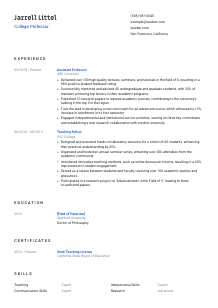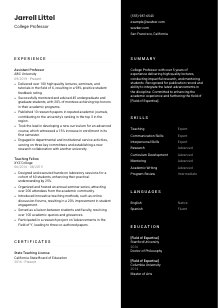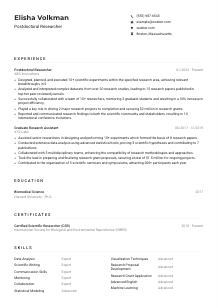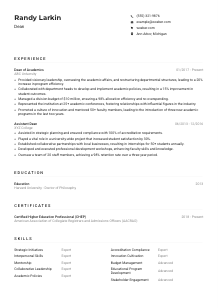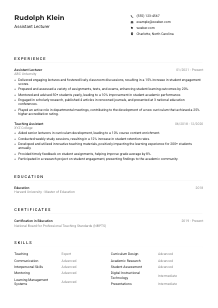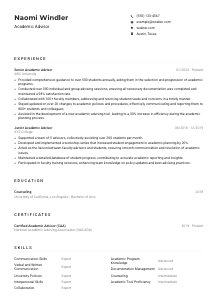College Professor Resume Example
Molding minds, but your resume grades a B-? Elevate it with this College Professor resume example, honed using Wozber free resume builder. See how seamlessly you can align your scholarly journey with academic expectations, and take your teaching career to the head of the class!
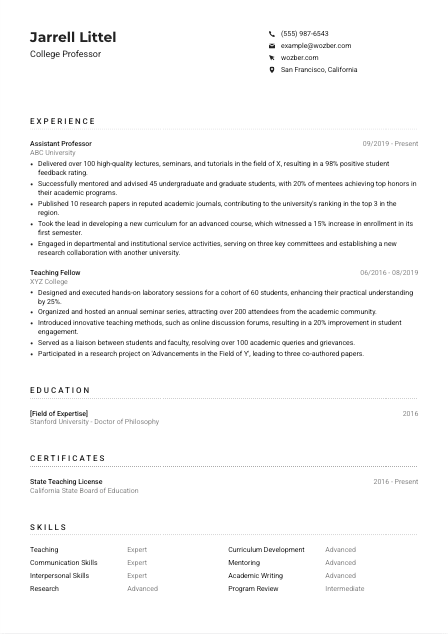
How to write a College Professor Resume?
Greetings, aspiring College Professor! In a realm where the fusion of knowledge and inspiration shapes the future, your resume is the scroll that encapsulates your academic journeys and scholarly accomplishments. With the help of Wozber's free resume builder, crafting an ATS-compliant resume that resonates with the expectations of your dream institution is within reach.
This guide, adorned with a resume example optimized for Applicant Tracking Systems using Wozber's ATS resume scanner, is your beacon as you navigate the depths of resume creation specific to the College Professor role. Let's embark on this scholarly quest together!
Personal Details
First impressions in academia are as crucial as the opening lines of a groundbreaking research paper. The Personal Details section is your resume's frontispiece, setting the stage for the narrative of your academic pursuits.
1. Your Name: The Banner of Your Brand
Consider your name the title of your most acclaimed publication; it should stand out prominently. Employ a clear, legible font, allowing your name to be the beacon that guides the hiring committee through your scholarly landscape.
2. Reflect The Role
Position yourself as the missing piece in the academic jigsaw by aligning with the title 'College Professor'. Display it proudly just beneath your name, telegraphing your aspirations and area of mastery to the hiring manager at first glance.
3. The Scholar's Signal - Contact Information
"Phone Number:" Confirm its accuracy to ensure the heralds can reach you. "Professional Email Address:" Craft it wisely, akin to titling your research - firstname.lastname@email.com. This is the digital bridge between you and your academic future.
4. A Scholar's Realm
The call for local residency was clear. By specifying "San Francisco, California" within your contact details, you signal readiness and eliminate any doubts about relocation, aligning seamlessly with the institution's logistical preferences.
5. The Digital Portfolio
Should your scholarly endeavors extend online, including a link to your professional profile or personal academic website can bolster your visibility. Ensure it acts as a mirror, reflecting the depth of your research and academic contributions.
Takeaway
Mastering the Personal Details is akin to perfecting the art of the academic handshake. This section bridges your past accomplishments with future aspirations, setting a professional yet personalized tone for your narrative journey. Be concise, precise, and aligned with your academic quest.





Experience
As you delve into the Experience section, view each entry as a chapter in your scholarly epic. Here, your teaching odysseys, research triumphs, and academic engagements are woven into a compelling tale of pedagogic valor and intellectual vigor.
- Delivered over 100 high‑quality lectures, seminars, and tutorials in the field of X, resulting in a 98% positive student feedback rating.
- Successfully mentored and advised 45 undergraduate and graduate students, with 20% of mentees achieving top honors in their academic programs.
- Published 10 research papers in reputed academic journals, contributing to the university's ranking in the top 3 in the region.
- Took the lead in developing a new curriculum for an advanced course, which witnessed a 15% increase in enrollment in its first semester.
- Engaged in departmental and institutional service activities, serving on three key committees and establishing a new research collaboration with another university.
- Designed and executed hands‑on laboratory sessions for a cohort of 60 students, enhancing their practical understanding by 25%.
- Organized and hosted an annual seminar series, attracting over 200 attendees from the academic community.
- Introduced innovative teaching methods, such as online discussion forums, resulting in a 20% improvement in student engagement.
- Served as a liaison between students and faculty, resolving over 100 academic queries and grievances.
- Participated in a research project on 'Advancements in the Field of Y', leading to three co‑authored papers.
1. Analyze the Academic Quest
Dissect the job requirements like a critical literature review. Identify and underline those responsibilities and achievements that echo the demands of a College Professor.
2. The Placement of Scholars
Narrate your academic journey in reverse-chronological order, beginning with your current or most recent role. Detail the institution, your title, and the timeline of your tenure, constructing a clear pathway through your professional development.
3. Crafting Your Legacy
For each position, delineate your achievements and responsibilities that best match the job description. Did you uplift the academic spirit through innovative teaching methodologies or contribute significantly to your field with scholarly publications? Let these highlights illuminate your path.
4. The Quantification of Excellence
Where possible, measure your impact. The inclusion of metrics, such as "Published 10 research papers" or "Mentored 45 students," offers a tangible testament to your contributions, bringing your academic narrative to life.
5. Relevance is the Key
Align your experiences with the soul of your academic discipline, leaving aside unrelated anecdotes. Every sentence should contribute to the portrait of you as the ideal College Professor candidate, refined and focused on your scholarly impact.
Takeaway
The Experience section is your saga, a testament to your academic journey and contributions. It should invite the reader into your world of intellectual achievements and pedagogical advancements. Craft it with intention and precision, making each word a beacon of your potential.
Education
In the hallowed halls of academia, your education is the bedrock upon which your scholarly identity is built. The Education section is not simply a list of degrees; it's a testament to your dedication, a reflection of your journey through the realms of knowledge.
1. The Keystone Degree
As the foundation of your academic identity, your Ph.D. aligns you with the realm's high expectations. Ensure that your highest degree, a Doctor of Philosophy in your chosen field, is front and center, paralleling the job's primary requisite.
2. The Structure of Scholarship
Present your academic qualifications clearly and succinctly. For each degree, include the field of study, the honorific attained, the institution's name, and the year of your triumph. This structure will guide the discerning eyes of hiring committees through your educational journey.
3. Tailoring Your Academic Attire
Mirror the job description's academic prerequisites in your resume. This direct alignment reassures hiring committees of your qualifications and readiness to stand at the lectern or lead groundbreaking research in your field.
4. The Tome of Courses
Although not necessary for seasoned scholars, younger academics may benefit from listing key courses or projects, especially if they directly resonate with the job description. This can add depth to your scholarly narrative.
5. Beyond the Diploma
Any additional academic achievements, such as honors or memberships in scholarly organizations, can enrich your profile. These details sketch a fuller picture of your engagement and stature within the academic community.
Takeaway
The Education section stands as the foundation of your scholarly persona. Ensure it reflects not just the requisites but the depth of your academic pursuit. This section is a beacon, guiding potential institutions to see you as a pillar of knowledge and a beacon of innovation.
Certificates
While the realm of college professorship often draws upon the depth of one's scholarly work rather than certifications, this section can still serve as a testament to your dedication to continued learning and compliance with educational standards.
1. The Search for Clarity
Begin by revisiting the job posting, noting if specific certifications are mentioned or implied. While our College Professor example did not request specific certificates, this is where you'd align any that you possess.
2. The Spirited Scholar's Selection
Emphasize certifications that are most relevant to the academic field or that reflect your commitment to pedagogy and research. This selection process ensures only the most impactful recognitions are shared, avoiding the dilution of your academic profile.
3. The Chronicle of Achievement
For each certificate, consider adding the date of achievement, especially if it's recent or particularly relevant. This demonstrates your ongoing commitment to academic excellence and professional development.
4. The Eternal Learner
The academic world is in constant flux, with new theories and discoveries pushing the boundaries of knowledge. Regular updates to your certifications show a commitment to staying at the forefront of your field, signaling your academic agility and ongoing curiosity.
Takeaway
Certificates, while not central to the professorial journey, can underscore your enthusiasm for continual growth and your adherence to the evolving standards of academia. Let this section reflect your journey beyond the classroom, showcasing your dedication to lifelong learning.
Skills
Within the cloistered halls of academia, your skills are the tools with which you sculpt young minds and carve out new knowledge. This section offers a concise snapshot of your professional and interpersonal capabilities, tailored to the rigorous demands of the role.
1. Decoding the Academic Codex
First, dissect the job posting to unearth both explicit and implicit skills. This exercise will illuminate the specific competencies the institution values in a College Professor, laying the groundwork for your skills list.
2. The Chosen Skills
Equip your resume with a blend of hard and soft skills that align with the job's requirements and the essence of academia. Consider the inclusion of 'Teaching', 'Research', 'Academic Writing', and 'Curriculum Development', interwoven with essential interpersonal skills like 'Communication' and 'Mentoring'.
3. The Scholar's Codification
Resist the temptation to list every skill in your repertoire. Choose wisely, focusing on those abilities that will most intrigue the hiring manager and demonstrate your suitability as a guardian of knowledge and a mentor of future leaders.
Takeaway
The Skills section is a compact showcase of your capabilities, a declaration of your readiness to contribute to both the intellectual growth of students and the advancement of your field. Choose each skill with care, ensuring it adds to the narrative of you as an exceptional candidate for the College Professor role.
Languages
Language proficiency can elevate your teaching and research, allowing you to navigate the global academic community with ease. In a world where ideas transcend borders, your linguistic abilities become yet another facet of your academic persona.
1. The Academic Lingua Franca
Per our job description, strong English language skills are paramount. Thus, emphasizing your native or fluent command of English is crucial, as it's the medium through which you'll convey complex ideas and foster intellectual discourse.
2. The Scholar's Vernacular
Though the job may not explicitly demand additional languages, consider listing them to underscore your versatility. Being able to engage with academic works in their original language or communicate with a diverse student body can be invaluable assets.
3. Proficiency Unveiled
For each language listed, clarity about your proficiency level is key. Whether 'Native', 'Fluent', 'Intermediate', or 'Basic', this honesty showcases not only your linguistic range but also your integrity as a scholar.
4. The Global Context
In the event that the College Professor role involves interaction with international scholars or texts, your multilingual abilities become an even more significant advantage, allowing you to access and disseminate knowledge across linguistic barriers.
Takeaway
Your linguistic skills do more than just allow communication; they open doors to new worlds of understanding and cooperation. Highlight your command of languages with pride, positioning yourself as a scholar whose insights are as diverse as the global academic community.
Summary
The Summary section of your resume is your moment to reflect the essence of your academic journey, distilled into a potent elixir of skills, experiences, and aspirations. It offers a panoramic view of your scholarly landscape, inviting the hiring manager to delve deeper.
1. The Core of Your Quest
Commence with an introspective examination of the job's demands and how they align with your academic odyssey. This grounding perspective will shape a summary that resonates with the essence of being a College Professor.
2. A Prelude to Scholarship
Introduce yourself through a statement that encapsulates your professional identity and your primary contributions to academia. Highlight your role as an educator, researcher, and academic leader, laying out the breadth of your journey.
3. The Pillars of Your Application
Distill your narrative to include key achievements and skills that address the role's requirements. Demonstrate the unique impact you've made in your field and within the academic community, showcasing how your journey aligns with the institution's visions.
4. The Essence in Brevity
Craft this section with care, ensuring it serves as an engaging introduction rather than an exhaustive account. Aim for clarity and conciseness, inviting the hiring manager to explore the depth of your contributions detailed throughout the resume.
Takeaway
The Summary is your opportunity to captivate and intrigue, setting the tone for the rich narrative that follows. Let it reflect your academic identity and commitment to shaping future generations, positioning you as the ideal candidate to advance the institutional mission.
Embarking on Your Academic Expedition
With these guided reflections, you are now equipped to craft a resume that not only showcases your academic prowess but also aligns seamlessly with the expectations of your dream role as a College Professor. Embrace the journey of resume crafting with Wozber, utilizing our free ATS-friendly resume templates, and ATS optimization tools like the ATS resume scanner. Your academic legacy awaits; let your resume be the catalyst that propels you into your next chapter of scholarly excellence.

- Ph.D. in the respective field or a closely related discipline.
- A minimum of 3 years of teaching experience at the college or university level.
- Demonstrated research or publication record in the field.
- Proven ability to mentor and advise students.
- Strong interpersonal and communication skills, both written and verbal.
- Valid teaching or academic license, if applicable.
- Must possess strong English language skills.
- Local residency in San Francisco, California.
- Deliver high-quality lectures, seminars, and tutorials in the relevant subject area.
- Conduct and publish research in their field while also engaging in departmental and institutional service activities.
- Mentor and advise undergraduate and graduate students, providing academic guidance and support.
- Participate in curriculum development, assessment, and program review.
- Stay abreast of the latest advancements in the discipline and integrate them into the curriculum.





